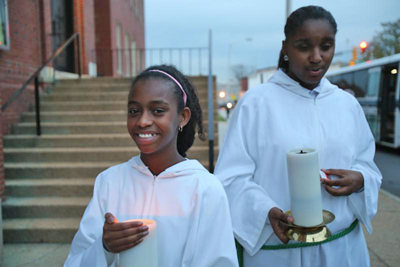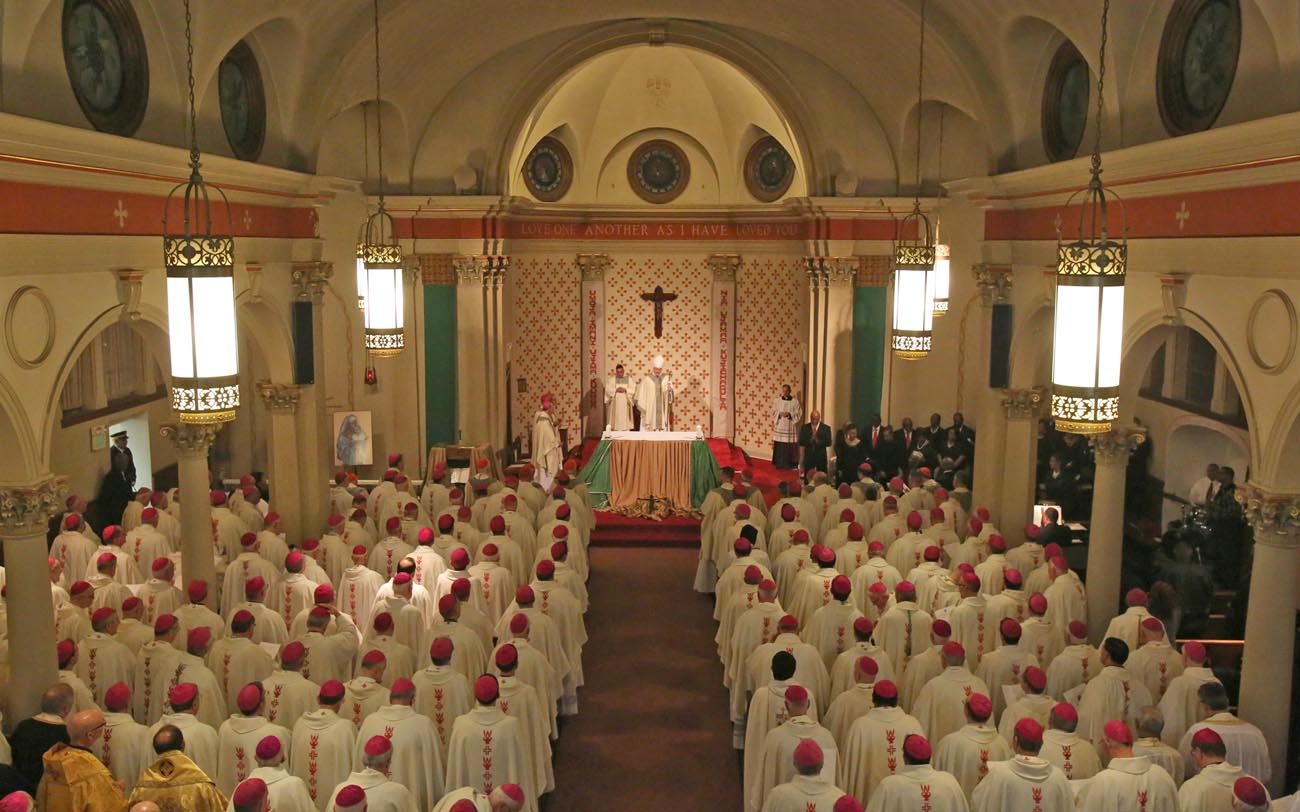UPDATED – BALTIMORE (CNS) — The U.S. bishops broke from tradition during this year’s fall assembly by celebrating Mass at a Baltimore church known as the “Mother Church” of black Catholics, rather than West Baltimore’s historic basilica.
“I pray our presence will convey the church’s solidarity with you,” said Baltimore Archbishop William E. Lori in opening remarks Nov. 14 to a few dozen parishioners attending the Mass with more than 250 bishops filling nearly every pew of the small church.
(See a related video.)
In his homily, Archbishop Joseph E. Kurtz of Louisville, Kentucky, said the bishops came to the church “to be present, to see with our own eyes, so that we might humbly take a step and lead others to do so.”
The Mass capped a busy first day of the bishops’ fall assembly and brought full circle a theme that ran through the much of the day’s proceedings — concern for the nation’s communities riven by racial tensions and the need for the country to heal from the acrimony of a presidential race now concluded.
[hotblock]
On the second day of the meeting, the bishops elected new officers and selected five committee chairmen-elect; approved a new strategic plan that sets five priorities for the bishops’ conference; approved creation of a permanent subcommittee on the church in Africa; and heard reports on the persecution of Christians in the Middle East and on cultural diversity in the church.
In elections Nov. 15, the bishops elected Cardinal Daniel N. DiNardo of Galveston-Houston to be president of the U.S. Conference of Catholic Bishops. He is the current vice president. As president, he succeeds Archbishop Joseph E. Kurtz of Louisville, Kentucky. Elected vice president was Archbishop Jose H. Gomez of Los Angeles. The new officers’ three-year terms begin when the assembly ends.
The bishops’ strategic plan incorporates the theme “Encountering the Mercy of Christ and Accompanying His People With Joy.” It sets as priorities for the next four years: evangelization; marriage and family life; human life and dignity; vocations; and religious freedom.
On Nov. 14, the bishops heard a plea from Archbishop Christophe Pierre, the new nuncio to the United States, that the U.S. bishops and the U.S. church as a whole reach out to young Catholics, meeting them where they are and engaging them in their faith.

Altar servers stand outside St. Peter Claver Church in Baltimore before Mass Nov. 14. The U.S. bishops’ traditional Mass for their annual fall general assembly was celebrated at the historic African-American church. (CNS photo/Bob Roller)
They heard reports on the 2017 convocation of Catholic leaders to be held in Orlando, Florida, next July, and got details of a simple celebration next year to mark the 100th anniversary of the U.S. Conference of Catholic Bishops.
As the meeting opened the bishops affirmed as a body a letter from Auxiliary Bishop Eusebio L. Elizondo of Seattle, as chairman of the migration committee, calling on President-elect Donald Trump “to continue to protect the inherent dignity of refugees and migrants.” The bishops’ group action followed by a day a TV interview in which Trump said one of his first actions would be to deport 2 million to 3 million people he described as “criminal and have criminal records” and entered the country without government permission.
In the letter, first released late Nov. 11, Bishop Elizondo said he was praying for Trump, “all elected officials and those who will work in the new administration. I offer a special word to migrant and refugee families living in the United States: Be assured of our solidarity and continued accompaniment as you work for a better life.”
In his final address to the bishops as USCCB president, Archbishop Kurtz discussed the need to move beyond the acrimony of the now-completed elections, but the main focus of his speech were the encounters he had in his three-year term in which he found that small and often intimate gestures provide big lessons for bishops to learn as they exercise their ministry.
He talked about his encounters with a Filipina woman whose main concern after the devastation of Typhoon Yolanda was for the well-being of her neighbors and community, with a young boy with Down syndrome in war-torn Ukraine who jumped into his arms and gave him a big smile, and with two dozen unaccompanied immigrant minors in federal custody who just wanted to study, pray and join their families.
[hotblock2]
Those stories and others he told his brother bishops reinforced for him the lesson that their concern is the common good and they must open their “hearts to the joy that others will give to us.”
Seeking the common good also will serve the nation as it moves forward from the “unprecedented lack of civility and even rancor” of the national elections.
In a final afternoon session and later at a news conference that concluded the first meeting day, Archbishop Wilton D. Gregory of Atlanta returned to the tensions of the election year.
He is chairman of the new Task Force to Promote Peace in Our Communities, created in July by Archbishop Kurtz in response to the wave of violence in a number of communities following shootings by and of police. In his presentation, he urged the bishops to issue, sooner rather than later, a document on racism, given “postelection uncertainty” and that some of the tensions have only gotten worse following the presidential election.
Earlier in the day, the bishops heard an update from Cardinal Timothy M. Dolan of New York on the planning for a four-day church convocation exploring the Gospel in American life next July. More than 3,000 people reflecting the diversity of the U.S. Catholic Church are expected to participate. Cardinal Dolan urged bishops in each diocese to send a delegation to the event.
Cardinal Dolan also reported on a simple, but meaningful celebration being planned for when the USCCB turns 100 next year. Events marking the anniversary will take place Nov. 12 as the bishops convene for their 2017 fall assembly.
The anniversary events will include a program on formation, with presentations by Cardinal Dolan on the founding of what was originally the National Catholic War Council and Bishop Earl A. Boyea of Lansing, Michigan, on themes of common concern over the years.
Cardinal Pietro Parolin, Vatican secretary of state, will be principal celebrant of an anniversary Mass at Baltimore’s Basilica of the National Shrine of the Assumption of the Blessed Virgin Mary. Cardinal Marc Ouellet, prefect of the Congregation of Bishops, will deliver the homily.
In his report as chairman of the bishops’ Ad Hoc Committee for Religious Liberty, Baltimore’s Archbishop Lori said all U.S. bishops are required to speak out for religious freedom for all people of faith whose beliefs are compromised.
Bishops must equip laypeople to speak in the public arena about the necessity to protect religious liberty when interventions by government officials at any level infringe on the free practice of religion, he stressed.
Cardinal Dolan, who is chairman of the bishops’ pro-life activities committee, also spent a few moments in the afternoon session to laud the work of Courage, an organization for gay Catholics who strive to remain faithful to Catholic teaching on sexual morality. “They do wonderful work,” he said. “They’re right in line with the wonderful outreach and pastoral solicitude Pope Francis has shown, and (have) tremendous respect for the dignity of the human person.”
Cardinal Dolan added, “They’re extraordinarily faithful to the church’s timeless teaching on chastity.” Moreover, he said, “they do great programs of formation for priests who would be called to this delicate ministry.”
Father Paul Check, who had run Courage for the past several years, was recalled by his home Diocese of Bridgeport, Connecticut, to minister there. He will be succeeded as director by Father Philip Bochanski, a priest of the Archdiocese of Philadelphia.
Most questions during the afternoon news conference focused on the postelection climate. Archbishop Gregory stressed that the church should play a role in helping restore peace in the current climate that is so inflamed.
He also pointed out that no political parties fully embrace all life issues, something that had been stressed by Chicago Cardinal Joseph Bernardin who died exactly 20 years ago.
On the issue of healing racial divides, he said the Catholic response should start at the parish level. “Words are cheap, actions stronger,” he added.
Archbishop Gomez spoke of the fear many immigrants have of possible deportation since Republican Donald Trump’s election as president. When asked if churches could possibly provide sanctuaries for this group, he said that was impossible to answer at this point.
***
Contributing to this story were Mark Pattison, Rhina Guidos, Carol Zimmermann and Dennis Sadowski.
PREVIOUS: Texas cardinal, L.A. archbishop elected USCCB president, vice president
NEXT: Text: Pope Francis’ message to U.S. bishops on Encuentro




Share this story